Have you ever noticed a strange vinegar-like smell coming from your cat? It may be a sign of an underlying issue that needs to be addressed. Understanding the causes of this odor can help you take the appropriate steps to ensure your cat’s well-being.
When a cat emits a vinegar-like smell, it could be a result of dental disease, skin infections, ear problems, or urinary tract infections. By recognizing the nature and source of the odor, you can better determine the necessary actions to resolve the issue.
Key Takeaways:
- A vinegar-like smell in cats could indicate dental disease, skin infections, ear problems, or urinary tract infections.
- Identifying the source of the smell is crucial for determining appropriate treatment.
- Maintaining good hygiene practices and seeking veterinary assistance can help prevent and address cat odors effectively.
- A balanced and high-quality diet may reduce unpleasant cat odors.
- Regular grooming and veterinary check-ups are essential for a clean and fresh-smelling cat.
The Importance of Identifying the Source of the Smell
When a cat emits a vinegar-like smell, it is essential to identify the underlying causes. This peculiar odor can be an indication of various factors such as dental disease, skin infections, ear problems, or urinary tract infections. However, in order to effectively address the issue, it is crucial to pinpoint the specific source of the smell.
Identifying the source of the vinegar-like smell in cats helps in determining whether it is related to oral health, skin conditions, ear infections, or urinary tract issues. By understanding the root cause, cat owners can take the necessary steps to address the problem and ensure their pet’s overall wellbeing. Whether it involves regular dental care, proper grooming, or seeking veterinary assistance, identifying the source of the smell is the first important step towards resolving the issue.
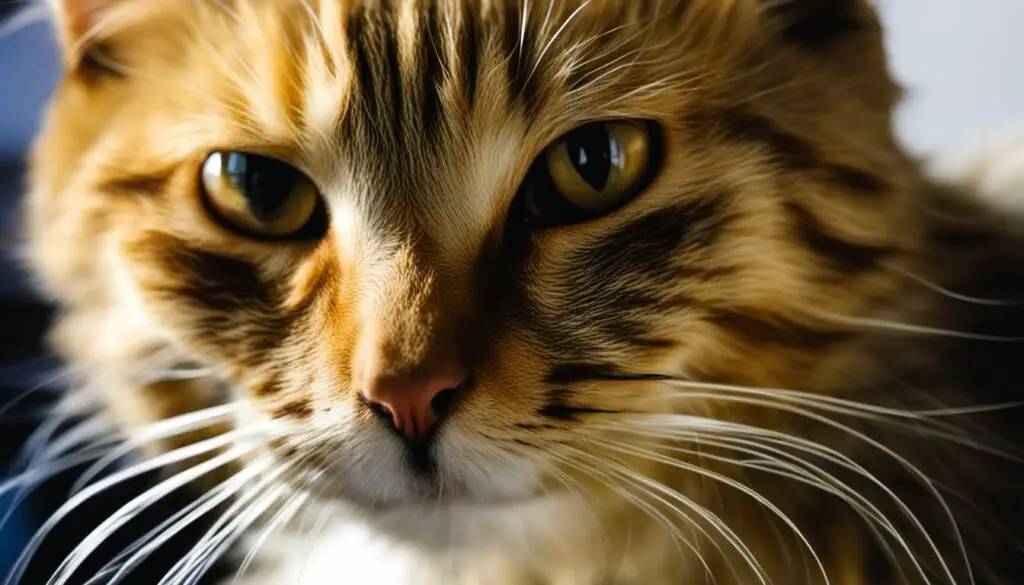
The Importance of Identifying the Source of the Smell
“Identifying the source of the vinegar-like smell in cats is crucial for appropriate treatment. Whether it’s related to dental diseases, skin infections, ear problems, or urinary tract issues, understanding the root cause is necessary to address the problem effectively.
By closely observing the nature and origin of the smell, cat owners can gather valuable information that can aid in diagnosis and treatment. This may involve checking for signs of dental issues such as plaque buildup or loose teeth, examining the skin for any signs of infections, monitoring the cat’s behavior for indications of ear problems, or observing any changes in urination patterns that could point to urinary tract issues. Taking note of these details will provide essential clues to help identify the specific source of the vinegar-like smell.
Once the source is identified, appropriate measures can be taken to address the issue and alleviate the unpleasant odor. This may involve implementing a dental care routine, administering medication for skin infections, cleaning the cat’s ears as directed by a veterinarian, or providing the necessary treatment for urinary tract infections. Veterinary guidance and regular check-ups are essential in ensuring the appropriate course of action is taken to resolve the issue and promote a fresh-smelling and healthy feline companion.
Common Causes of a Vinegar-like Smell in Cats
When your cat has a vinegar-like smell, it’s important to understand the common causes behind it. This odor can be an indication of various factors, including dental diseases, skin infections, ear problems, or urinary tract infections. By identifying the specific cause, you can take the necessary steps to address the issue and ensure your cat’s wellbeing. Let’s explore these common causes in more detail.
Dental Diseases
One of the primary causes of a vinegar-like smell in cats is dental diseases. Plaque buildup or loose teeth can lead to bad breath, resulting in an unpleasant odor resembling vinegar. It’s important to maintain proper dental hygiene for your cat, which includes regular brushing and dental check-ups to prevent and address dental diseases.
Skin Infections
Cats can develop skin infections due to various underlying health issues. Bacterial or yeast infections in the skin can contribute to odors, which may have a putrid or musty smell resembling vinegar. Regular grooming and maintaining your cat’s overall health are essential for preventing skin infections and their associated odors.
Ear Infections
Ear infections can also result in a vinegar-like smell in cats. Yeast or bacterial overgrowth in the ears can cause musty or fetid odors. It’s essential to regularly clean your cat’s ears and seek veterinary care for prevention and treatment of ear infections, reducing the unpleasant smell.
Urinary Tract Infections
Another common cause of a vinegar-like smell is urinary tract infections (UTIs). UTIs can manifest with symptoms such as increased frequency of urination, crying while urinating, or excessive grooming of the genital area. Maintaining a healthy weight, providing adequate hydration, and seeking veterinary care can help prevent and treat UTIs, reducing the associated odors.
By understanding these common causes of a vinegar-like smell in cats, you can take the necessary steps to address and prevent them. Maintaining proper dental hygiene, regular grooming, and seeking veterinary care when needed will help ensure your cat stays fresh-smelling and healthy.
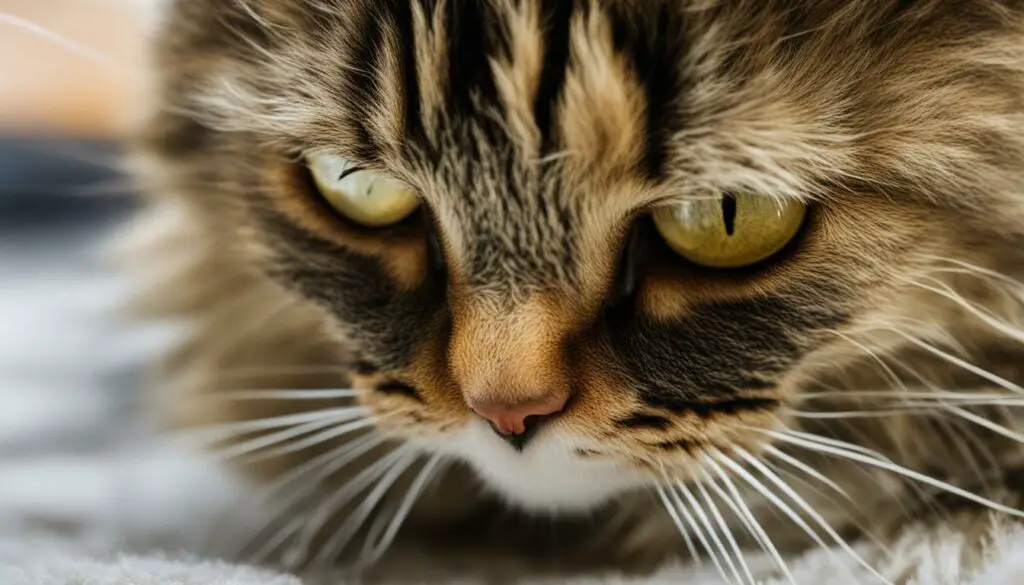
Dental Health and Vinegar-like Odor in Cats
One of the common causes of a vinegar-like odor in cats is dental health issues. Dental diseases, such as gum infections, tooth decay, plaque buildup, inflamed gums, and oral tumors, can create an unhealthy environment inside the mouth, leading to bad breath. When cats have dental problems, the foul smell can resemble vinegar, which can be unpleasant for both the cat and its owner.
To maintain good dental health in cats and prevent the vinegar-like odor, it is important to implement proper dental care practices. Regular toothbrushing with cat-friendly toothpaste, dental toys, and treats with special enzymes can help prevent dental diseases and maintain fresh breath. In addition, scheduling regular veterinary check-ups for professional dental cleanings and examinations is crucial for identifying and addressing any underlying dental issues.
It’s important to note that while dental health is a common cause of a vinegar-like odor in cats, other underlying factors can also contribute to the smell. Therefore, it is essential to consult a veterinarian for a thorough examination and proper diagnosis.
| Cause | Symptoms |
|---|---|
| Dental Diseases | Bad breath, inflamed gums, loose teeth, plaque buildup |
| Oral Tumors | Bad breath, difficulty eating or swallowing, growths in the mouth |
| Kidney Disease | Urinary odor in breath, increased thirst, weight loss |
By addressing dental issues and maintaining good oral hygiene, cat owners can help prevent the vinegar-like odor and ensure their feline friends have fresh breath and healthy mouths.
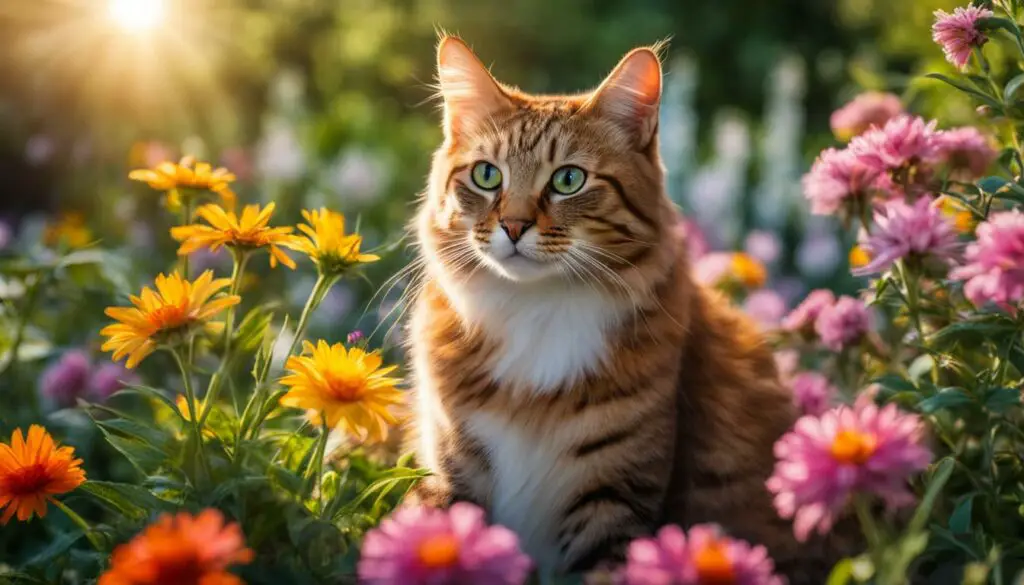
Cats can develop dental diseases that cause a vinegar-like odor. Regular dental care and veterinary check-ups are crucial for preventing and addressing dental issues.
The Role of Skin Infections in Vinegar-like Odor
Skin infections can play a significant role in the development of a vinegar-like odor in cats. These infections are often caused by underlying health issues such as allergies, wounds, parasites, cancer, or immune disorders. When the skin’s natural protective mechanisms are compromised, bacteria can grow and cause unpleasant odors. Bacterial infections typically have a putrid smell, while yeast infections are often described as musty.
Regular grooming is essential for preventing and managing skin infections in cats. This includes brushing their fur to remove any debris or dead skin cells, as well as regularly cleaning their ears to prevent the buildup of wax and moisture that can lead to infections. Additionally, maintaining the cat’s overall health through a balanced diet and regular veterinary check-ups can help strengthen their immune system and reduce the risk of skin infections.
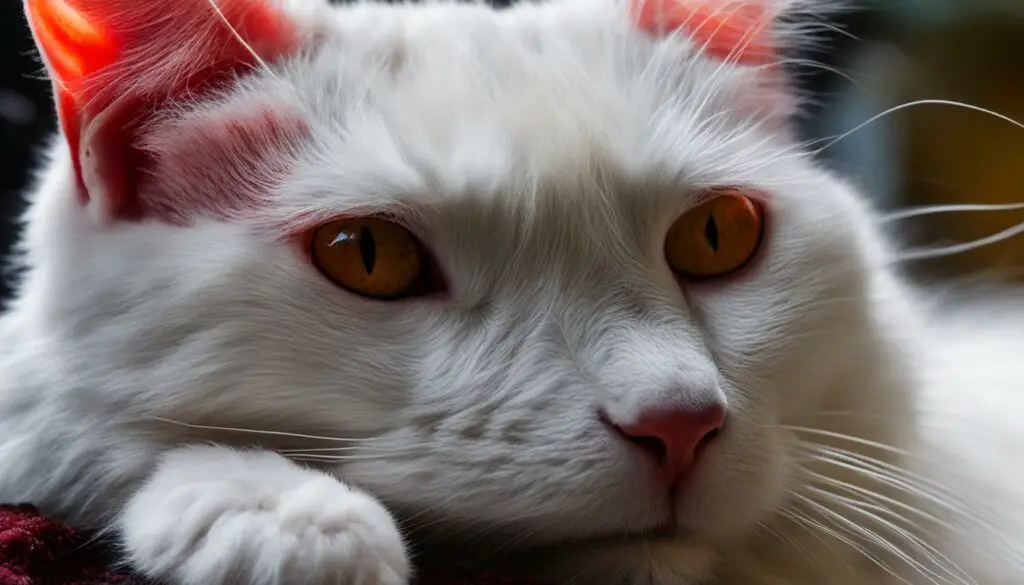
Table: Skin Infections and Associated Odors
| Infection Type | Odor Description |
|---|---|
| Bacterial Infections | Putrid |
| Yeast Infections | Musty |
By addressing and treating skin infections promptly, cat owners can help eliminate the vinegar-like odor and ensure their feline companions remain fresh-smelling and healthy.
The Role of Ear Infections in Cat Odor
Ears are one of the key areas to consider when a cat emits a vinegar-like smell. Ear infections can be a common cause of this odor, often due to yeast or bacterial overgrowth. Musty smells are typically associated with yeast infections, while bacterial infections may produce a fetid or sweet smell. An accumulation of dark material resembling coffee grounds in the ears can be a sign of ear mite infestation. Regular ear cleaning and veterinary care are essential for preventing and treating ear infections and the associated odors.
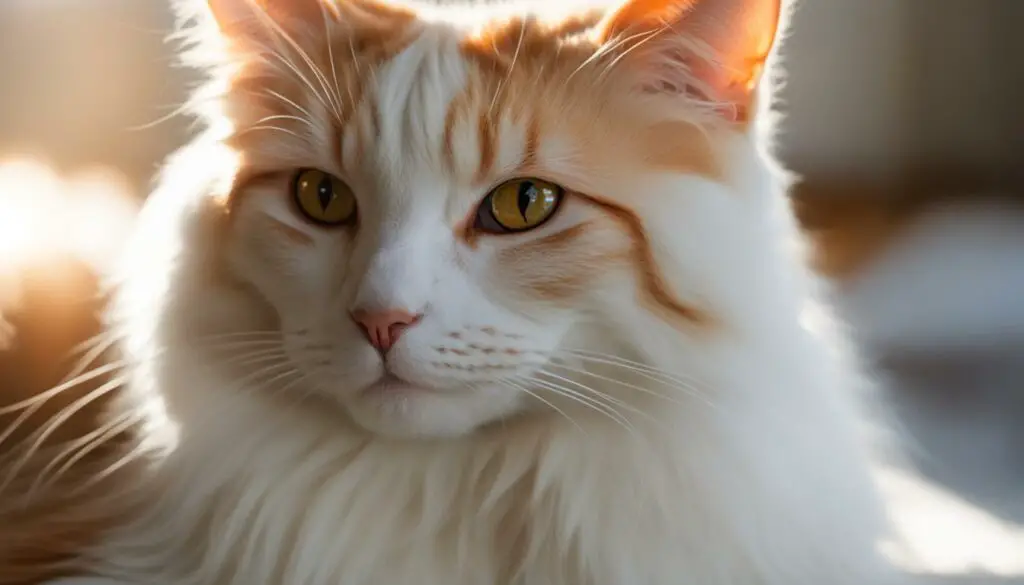
When it comes to addressing ear infections in cats, professional guidance is crucial. A veterinarian can properly diagnose and prescribe appropriate treatments, which may include ear drops or antibiotics. It’s important to follow the recommended treatment plan and complete the entire course of medication to ensure the infection is fully resolved.
“Ear infections in cats can cause odors associated with yeast or bacterial overgrowth.”
Prevention is also key when it comes to ear infections and their associated odors. Regular ear cleaning can help remove excess wax and debris, reducing the risk of infection. However, it’s essential to use appropriate cleaning solutions and techniques recommended by a veterinarian to avoid causing harm to the cat’s ears.
Signs of Ear Infections in Cats
- Excessive scratching or pawing at the ears
- Head shaking or tilting
- Redness or swelling of the ear canal
- Presence of a foul odor
- Discharge or dark material in the ears
- Behavioral changes, such as irritability or depression
If you notice any of these signs in your cat, it’s important to seek veterinary attention promptly. Early diagnosis and treatment can help prevent further complications and discomfort for your furry friend. Remember, proper ear care is an essential part of overall feline hygiene and can contribute to a fresh-smelling and healthy cat.
| Causes of Ear Infections in Cats | Treatment |
|---|---|
| Yeast or bacterial overgrowth | Prescription ear drops or antibiotics |
| Ear mite infestation | Anti-parasitic medications |
| Allergies | Identification and avoidance of allergens, antihistamines |
| Injuries or foreign objects in the ear | Cleaning, removal of objects under sedation if necessary |
| Anatomical abnormalities | Surgery to correct the underlying issue |
Rear End Odor in Cats
When it comes to our furry feline friends, maintaining good hygiene is essential. However, some cats may develop an unusual smell coming from their rear end. This odor can be an indication of underlying health issues that require attention and care.
There are several factors that can contribute to a strong smell emanating from a cat’s rear end. Cats with conditions that affect their grooming abilities, such as arthritis or obesity, may develop a greasy, unkempt coat and an unusual smell. Additionally, diarrhea or urinary tract infections can also contribute to a strong odor in this area.
To address rear end odors in cats, it is important to monitor their hygiene and address any underlying health issues. Regular grooming, including cleaning the hindquarters, can help remove any trapped fecal matter or urine that may be causing the odor. If the odor persists or is accompanied by other concerning symptoms, it is recommended to seek veterinary assistance for further evaluation and treatment.
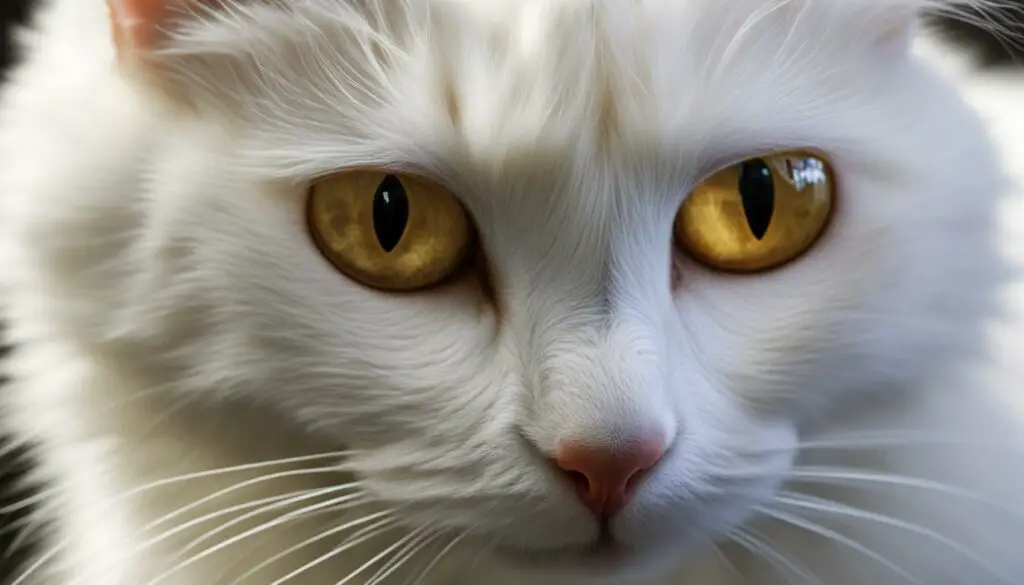
Anal Glands and their Impact on Cat Odor
When it comes to cat odor, one often overlooked culprit is the anal glands. Cats have two anal glands located near the anus that produce a musky or fishy smelling material. Normally, this substance is released sporadically and goes unnoticed. However, certain conditions can cause these glands to become more active, resulting in persistently strong and overwhelming odors.
The anal glands can become impacted or infected, leading to a foul smell that can be reminiscent of vinegar. Blockages or infections in the glands can cause discomfort for the cat and may be accompanied by symptoms such as scooting on the floor or excessive grooming in the rear end area. It is important to have a veterinarian examine the cat and provide appropriate treatment to address anal gland-related issues and alleviate the associated odors.
Regular veterinary check-ups and proper hygiene practices can help prevent anal gland problems. Additionally, maintaining a healthy diet and providing adequate hydration can contribute to the overall health of the anal glands and minimize any unpleasant smells. By addressing anal gland issues and prioritizing your cat’s overall well-being, you can effectively manage and control cat odors related to the anal glands.
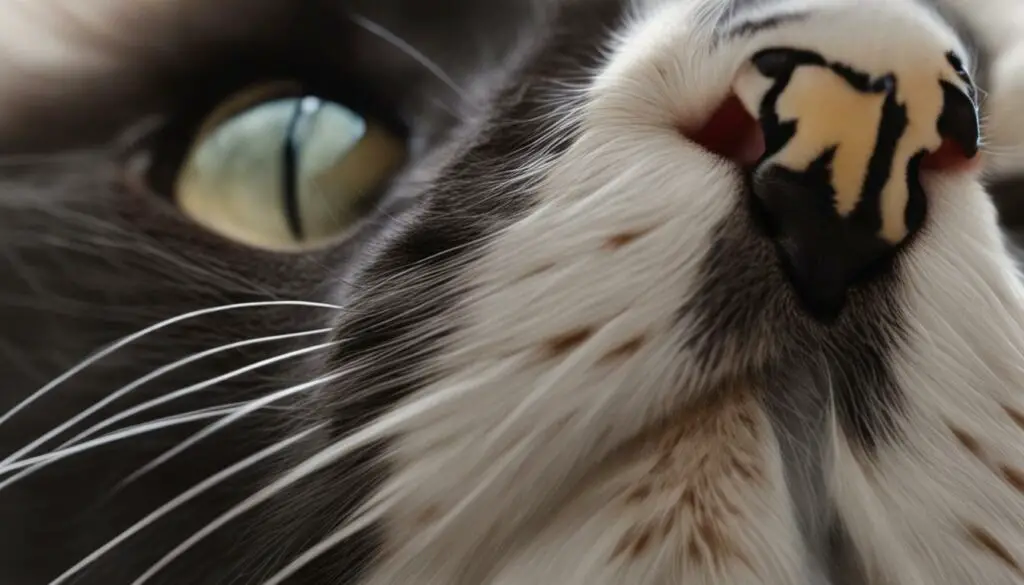
Detecting Anal Gland Problems in Cats
While cats are typically adept at self-grooming, it’s important for owners to be vigilant in monitoring their cat’s hygiene and behavior. Signs of anal gland issues can include excessive licking or biting at the rear end, scooting, or a noticeable foul odor. If you notice any of these symptoms, it is recommended to consult with a veterinarian to determine the cause and appropriate course of action. Early detection and treatment can help prevent further complications and discomfort for your feline friend.
Addressing Bad Smells in Cats
When your cat has a vinegar-like smell, it’s important to take action and address the underlying causes. Identifying the source of the odor is crucial in determining the appropriate steps to resolve the issue. Whether it’s related to oral health, skin infections, ear problems, or urinary tract issues, thorough observation and veterinary assistance can help diagnose and treat the problem effectively.
To get rid of vinegar smell on your cat, it is recommended to seek veterinary assistance for a proper diagnosis of the underlying issue. Your veterinarian can provide appropriate treatment options based on the specific cause of the odor. Additionally, maintaining good hygiene practices for your cat, such as regular grooming and cleaning, can help minimize odors. Implementing preventive measures, such as providing a balanced and high-quality diet and addressing any medical conditions promptly, can also contribute to reducing and eliminating bad smells in cats.
Remember, persistent or unusual odors in your cat should not be ignored. By taking the necessary steps to identify and address the source of the smell, you can ensure the well-being and freshness of your beloved feline companion.

Table: Common Causes of Bad Smells in Cats
| Cause | Description |
|---|---|
| Dental Diseases | Plaque buildup, gum infections, or tooth decay can lead to bad breath |
| Skin Infections | Bacterial or yeast infections can cause unpleasant odors |
| Ear Infections | Yeast or bacterial overgrowth in the ears can produce musty or fetid smells |
| Rear End Odor | Poor hygiene or conditions affecting grooming habits may cause a greasy coat and unusual smell |
| Anal Gland Issues | Infections or dysfunction of the anal glands can result in persistent odors |
| Urinary Tract Infections | Infections in the urinary tract can cause a vinegar-like smell |
“By identifying the specific cause, cat owners can take the necessary steps to address the problem and ensure their pet’s well-being.”
By understanding the common causes of bad smells in cats and taking appropriate actions, you can help your feline friend stay fresh-smelling and healthy.
Managing Litter Box Odors
Litter box odors can be a common challenge for cat owners. By implementing a few simple strategies, you can effectively manage and minimize unpleasant smells in your home. Here are some tips:
- Regular scooping: Scooping the litter box daily is essential for preventing odors from building up. Remove solid waste and clumps of urine-soaked litter, disposing of them properly.
- Frequent litter changes: Changing the litter regularly helps maintain a fresh-smelling litter box. Aim to replace the litter completely every 1-2 weeks, or as needed. Dispose of used litter in a sealed bag or container.
- Odor-neutralizing litter: Choose a litter brand that is specifically designed to neutralize odors. Look for litters that contain activated charcoal or baking soda, as these can help absorb and eliminate unpleasant smells.
- Multiple litter boxes: Having enough litter boxes for each cat in your household can reduce competition and prevent overcrowding. The general rule is to provide one litter box per cat, plus an extra box. This helps minimize odor accumulation and ensures each cat has easy access to a clean litter box.
- Air purifiers and filters: Consider using electronic air purifiers or charcoal filters near the litter box area to help reduce airborne odors. These devices can help improve air quality and keep your home smelling fresh.
Remember, maintaining a clean litter box is essential not only for odor control but also for your cat’s hygiene and well-being. Regular cleaning and proper litter box management can help create a pleasant environment for both you and your feline companion.
| Advantages | Disadvantages | |
|---|---|---|
| Regular scooping | Prevents odor build-up | Requires daily maintenance |
| Frequent litter changes | Maintains a fresh scent | Requires additional litter |
| Odor-neutralizing litter | Eliminates unpleasant smells | May be more expensive |
| Multiple litter boxes | Reduces overcrowding and odor | Requires additional space |
| Air purifiers and filters | Improves air quality | Additional expense |
Implementing these strategies can help you effectively manage litter box odors and create a fresh-smelling home for you and your beloved cat.
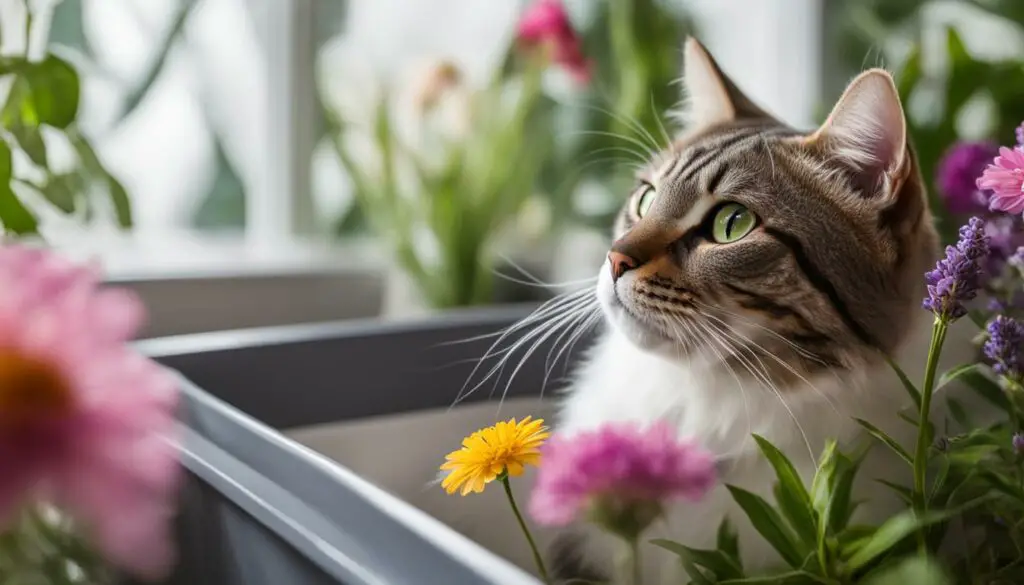
The Role of Diet in Cat Odor Control
A cat’s diet plays a significant role in controlling their body odor. Choosing the right food can help minimize unpleasant smells and promote overall health. A high-quality diet that prioritizes meat or meat meal as the first ingredient is important for cats. Such diets provide essential nutrients and proteins, which contribute to a healthy coat and reduced odor.
Probiotics are another essential component in cat food. These beneficial bacteria support a healthy gut and aid in digestion. By promoting a balanced digestive system, probiotics help reduce gastrointestinal issues that can lead to smelly odors. Look for cat food brands that include probiotics to ensure optimal digestive health and odor control.
| Dietary Ingredient | Benefits |
|---|---|
| Meat or Meat Meal | Provides essential nutrients and proteins for a healthy coat and reduced odor |
| Probiotics | Promotes a healthy gut and aids in digestion, reducing gastrointestinal issues and smelly odors |
| Yucca Extract | Reduces odor-causing proteins in urine and feces |
Another beneficial ingredient to look for in cat food is yucca extract. This natural extract helps reduce the odor-causing proteins in urine and feces, keeping your cat’s litter box and surrounding areas fresher. Yucca extract is known for its odor-neutralizing properties, and incorporating it into your cat’s diet can make a noticeable difference in controlling unpleasant smells.
When making changes to your cat’s diet, it’s essential to proceed gradually to prevent digestive upset. Consult with your veterinarian to determine the best dietary options for your cat. Together, you can create a nutrition plan that supports optimal health and minimizes unwanted odors.
Dealing with Bad Breath in Cats
Bad breath in cats can be a common issue, and it’s important to address it for the well-being of your feline companion. The presence of bad breath, also known as halitosis, can be a sign of dental problems such as gum infections or tooth decay. It occurs when bacteria build up in the mouth, leading to foul-smelling breath. Regular dental care is essential to prevent these issues and maintain fresh breath in your cat.
To keep your cat’s teeth and gums healthy, consider incorporating regular toothbrushing into their grooming routine. Use toothpaste specifically formulated for cats, as human toothpaste can be harmful to them. Dental treats and toys can also help maintain oral hygiene and reduce the risk of dental diseases. Additionally, scheduling regular veterinary check-ups is crucial to catch any dental issues early on and prevent them from progressing.
If your cat’s bad breath persists even with proper dental care, it could be a sign of underlying health problems. Conditions such as kidney disease or diabetes can cause urine-like or sweet-smelling breath. If you notice persistent bad breath accompanied by other symptoms such as excessive thirst or weight loss, it’s essential to consult a veterinarian for a thorough examination and appropriate treatment.
“Regular dental care is essential to prevent dental problems and maintain fresh breath in cats.”
| Cause | Symptoms | Treatment |
|---|---|---|
| Gum infections | – Bad breath | – Regular toothbrushing – Dental treats and toys – Veterinary check-ups |
| Tooth decay | – Bad breath | – Regular toothbrushing – Dental treats and toys – Veterinary check-ups |
| Kidney disease | – Urine-like breath | – Veterinary treatment for underlying condition |
| Diabetes | – Sweet-smelling breath | – Veterinary treatment for underlying condition |
Preventing and addressing bad breath in cats requires a combination of regular dental care and veterinary attention. By prioritizing your cat’s oral health and seeking professional help when needed, you can ensure that they have fresh breath and maintain overall well-being.
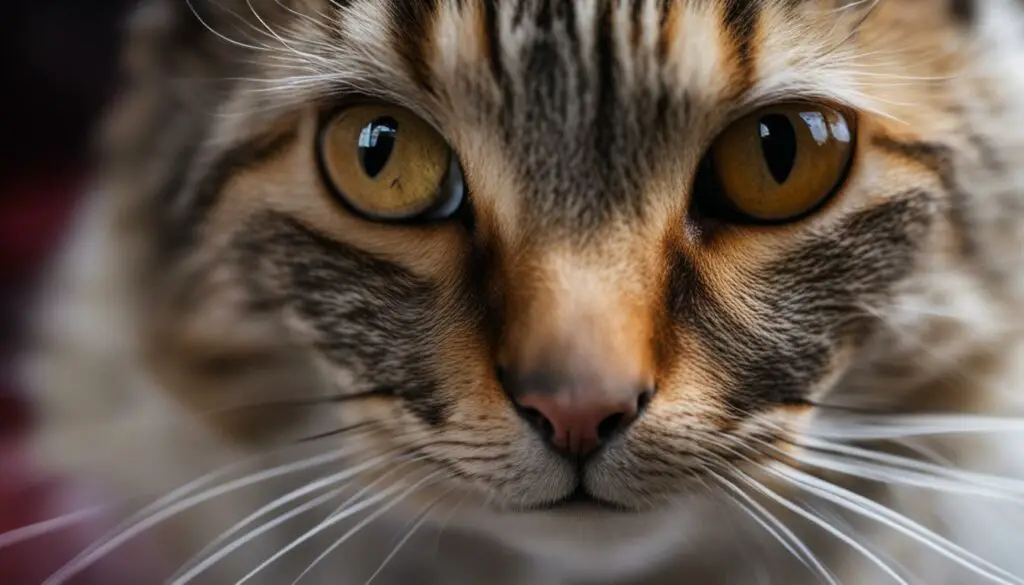
The Fishy Smell in Cats
When it comes to cats, there are many different smells that can arise, but one that can be particularly concerning is a constant fishy smell. This odor can indicate problems with the sac glands located near the anus. Blockages, infections, or abscesses in these glands can cause persistent and unpleasant odors. Along with the fishy smell, you may notice your cat engaging in excessive cleaning or scooting on the floor.
To properly address the fishy smell in cats, it is essential to have a veterinarian examine your cat. They will be able to diagnose any gland-related issues and recommend appropriate treatment. Treating these underlying issues is the key to resolving the odor problem and ensuring the well-being of your feline companion.
Remember, if you notice any unusual smells coming from your cat, it is always important to seek veterinary attention. By addressing these issues promptly, you can ensure the best possible care for your cat and keep them smelling fresh and clean.
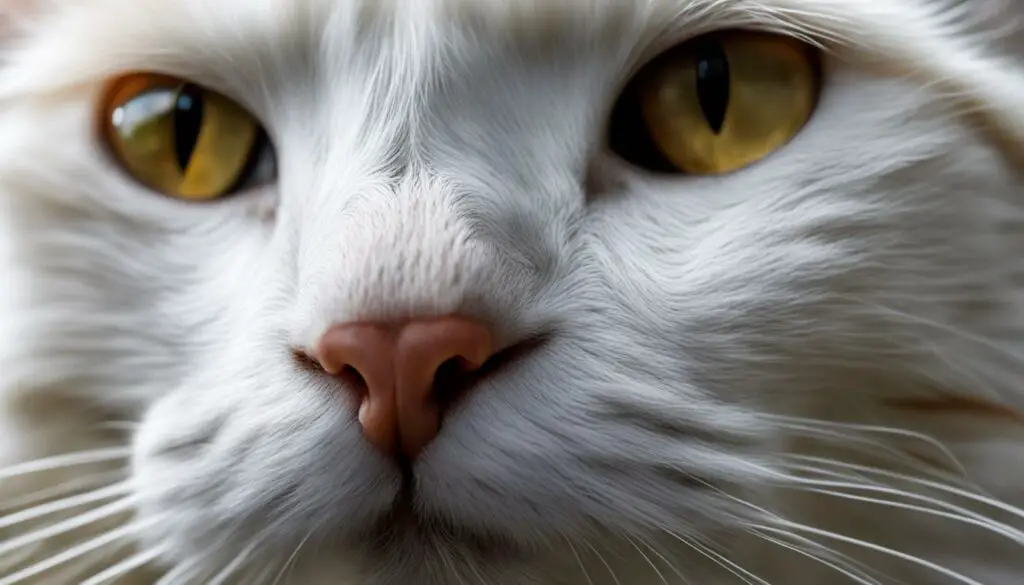
The Role of Urinary Tract Infections in Cat Odor
Urinary tract infections (UTIs) can be a significant cause of a vinegar-like smell in cats. These infections occur when bacteria enter the cat’s urinary system, leading to inflammation and discomfort. Understanding the signs and symptoms of UTIs can help cat owners identify and seek appropriate treatment for their feline companions.
Common signs of a urinary tract infection in cats include increased frequency of urination, difficulty urinating, blood in the urine, and urinary accidents outside of the litter box. Cats may also exhibit signs of pain or discomfort while urinating, such as crying or vocalizing. These symptoms can be accompanied by a distinct vinegar-like odor, which is often caused by the presence of certain bacteria in the urine.
It is important to note that not all cases of urinary tract infections in cats present with a strong odor. Some cats may display other symptoms without any noticeable change in odor. However, if cat owners observe a persistent vinegar-like smell, along with other signs of a UTI, it is essential to seek veterinary care promptly.
| Signs of Urinary Tract Infections in Cats | Treatment Options |
|---|---|
| Frequent urination | Antibiotics |
| Difficulty urinating or straining | Pain relief medication |
| Blood in the urine | Increased hydration |
| Urinary accidents outside the litter box | Urinary acidifiers |
Treatment for urinary tract infections in cats typically involves a course of antibiotics to eliminate the bacteria causing the infection. Pain relief medication may also be prescribed to alleviate discomfort during urination. In some cases, increased hydration and the use of urinary acidifiers may be recommended to promote a healthy urinary system.
Preventing urinary tract infections in cats can be achieved through various measures, including maintaining good litter box hygiene, providing fresh and clean water, and feeding a balanced diet that supports urinary health. Regular veterinary check-ups can help detect underlying issues that may increase the risk of UTIs, such as bladder stones or anatomical abnormalities. By taking proactive steps to prevent and identify urinary tract infections, cat owners can help ensure their feline companions enjoy a healthy and odor-free life.
Maintaining Good Hygiene Practices for Cats
Proper grooming practices are essential for maintaining a cat’s hygiene and minimizing odors. Regular bathing, brushing, and ear cleaning can help prevent skin infections, matted fur, and ear-related issues that contribute to unpleasant smells. Fecal matter or urine trapped in the fur around the hind end can also cause odor, particularly in long-haired cats or those with diarrhea. Proper grooming techniques and regular veterinary check-ups are crucial for ensuring a clean and fresh-smelling cat.
In addition to grooming, it is important to keep the cat’s living environment clean. Regularly cleaning litter boxes and using odor-neutralizing litter can go a long way in minimizing unpleasant smells. Having multiple litter boxes available, especially in multi-cat households, can help prevent overcrowding and reduce odor buildup. Electronic air purifiers or charcoal filters can also be used to effectively eliminate lingering odors in the home.
Proper diet plays a significant role in maintaining a cat’s overall health and minimizing odors. Feeding a high-quality, balanced diet that prioritizes meat or meat meal as the first ingredient can help reduce odor-causing proteins in urine and feces. It is important to transition to new diets gradually to avoid digestive upset. Consultation with a veterinarian can provide guidance on selecting the most suitable diet for the cat’s specific needs.
| Grooming Tips for Cats | |
|---|---|
|
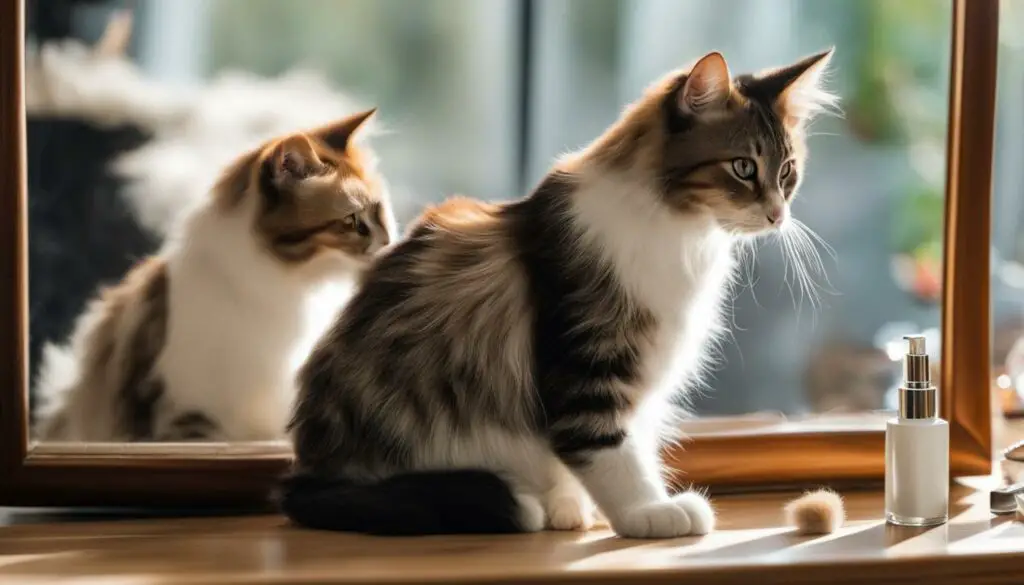 |
“Proper grooming practices are essential for maintaining a cat’s hygiene and minimizing odors.”
Conclusion
Maintaining good hygiene practices for cats is crucial for preventing and managing unpleasant odors. Regular grooming, including bathing, brushing, and ear cleaning, helps keep the cat’s coat clean and free from skin infections that can cause odors. Clean litter boxes, proper diet, and a clean living environment also contribute to reducing cat odors. By implementing these hygiene practices and seeking veterinary care when necessary, cat owners can ensure their feline companions remain fresh-smelling and healthy.
Conclusion
In conclusion, understanding why your cat smells like vinegar is crucial for ensuring their overall health and wellbeing. The vinegar-like odor can be a sign of various underlying issues, such as dental diseases, skin infections, ear problems, or urinary tract infections. By identifying the specific cause through observation and veterinary consultations, you can take the necessary steps to address the problem.
Maintaining good hygiene practices, such as regular bathing, brushing, and ear cleaning, is essential for minimizing odors and preventing skin infections. Additionally, providing a balanced and high-quality diet can help control body odor in cats. Switching to high-quality brands that prioritize meat as the first ingredient and contain probiotics for gut health can contribute to fresher-smelling cats.
If your cat’s odor persists or is accompanied by other symptoms, it is important to seek professional veterinary care. Veterinarians can diagnose and treat the underlying cause, whether it’s dental issues, skin infections, ear problems, or urinary tract infections. With proper care and attention, you can ensure your beloved feline companion stays healthy and fresh-smelling.
FAQ
Why does my cat smell like vinegar?
A vinegar-like smell in cats can be caused by various factors such as dental diseases, skin infections, ear problems, or urinary tract infections.
How can I identify the source of the vinegar-like smell in my cat?
Observing the nature and source of the smell can help in determining whether it’s related to oral health, skin conditions, ear infections, or urinary tract issues.
What are some common causes of a vinegar-like smell in cats?
Dental diseases, skin infections, ear infections, and urinary tract infections are some common causes of a vinegar-like smell in cats.
How does dental health contribute to vinegar-like odor in cats?
Dental diseases such as gum infections or tooth decay can lead to bad breath, which can contribute to a vinegar-like odor.
What role do skin infections play in vinegar-like odor in cats?
Skin infections, including bacterial or yeast infections, can contribute to unpleasant odors in cats.
How do ear infections cause a vinegar-like smell in cats?
Ear infections in cats can lead to odors associated with yeast or bacterial overgrowth, resulting in a vinegar-like smell.
Why does my cat have a vinegar-like smell around its rear end?
Rear end odors in cats can be caused by various factors, including grooming difficulties, diarrhea, or urinary tract infections.
How do anal glands impact cat odor?
Problems with the anal glands, such as blockages or infections, can cause persistent odors in cats.
How can I address bad smells in my cat?
Identifying the underlying cause, maintaining good hygiene practices, and seeking veterinary care when necessary can help address bad smells in cats.
How can I manage litter box odors?
Regular scooping, changing litter regularly, and using odor-neutralizing litter can help manage litter box odors in cats.
Can diet affect cat odor?
Yes, the quality of a cat’s diet can impact their body odor. Switching to a high-quality diet can help minimize cat odors.
How can I deal with bad breath in my cat?
Regular toothbrushing, dental toys, and treats with special enzymes can help prevent dental diseases and maintain fresh breath in cats.
Why does my cat have a fishy smell?
A fishy smell in cats can indicate problems with the sac glands located near the anus.
Can urinary tract infections cause a vinegar-like smell in cats?
Yes, urinary tract infections (UTIs) are a common cause of a vinegar-like smell in cats.
How can I maintain good hygiene practices for my cat?
Regular bathing, brushing, and ear cleaning can help maintain a cat’s hygiene and minimize odors.
What is the importance of identifying the source of the smell?
Identifying the specific cause helps in determining the appropriate actions to address the issue and ensure the cat’s wellbeing.
What should I do if my cat smells like vinegar?
If your cat has a persistent or unusual odor, it is recommended to seek veterinary assistance to diagnose and treat the underlying cause.








